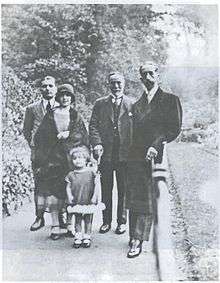Anbara Salam Khalidi
Anbara Salam Khalidi (Arabic: عنبرة سلام الخالدي) (4 August 1897–May 1986) was a Lebanese feminist, translator and author, who significantly contributed to the emancipation of Arab women.[1]
Anbara Salam Khalidi | |
|---|---|
| Born | 4 August 1897 Beirut, Ottoman Empire |
| Died | 1986 (aged 88–89) Beirut, Lebanon |
| Occupation | Translator |
| Language | Arabic |
| Citizenship | Lebanese |
| Alma mater | American University of Beirut |
| Period | Late 1920s – 1980s |
| Genre | Translations of classics |
| Spouse | Ahmad Samih Al Khalidi |
| Relatives | Salim Ali Salam (father) Saeb Salam (brother) Walid Khalidi (step son) Tarif Khalidi (son) |
Early life and education
Khalidi was born into an eminent Lebanese family in Beirut in 1897.[2][3] She was the daughter of Salim Ali Salam, a deputy in the Ottoman parliament and a merchant, and the sister of former Lebanese prime minister Saeb Salam.[4] Two of her brothers served as cabinet ministers of Lebanon.[5]
In 1913, during the First Arab Congress in Paris. Khalidi, along with two other women, sent a telegram to the congress. This telegram was the first message that was read aloud.[6]
She received a modern education and learned French. She and her siblings attended the Anglican Syrian College in Ras Beirut, which is the predecessor of the American University of Beirut.[7] From 1925 to 1927 she studied in the United Kingdom.[7]

Activities
After returning to Beirut, Khalidi joined the pioneering women's movement called Society for Women's Renaissance.[7] She worked there on advancing women's role in society and politics, on encouraging national Lebanese products of textiles and fashion, and on establishing schools for women and advocating for women education.
In 1927, Khalidi was invited by the American University of Beirut to speak about her time in England. Her speech was called "An Oriental Woman in England". Once she got on stage, she removed her veil.[6] She was the first Muslim woman in Lebanon to publicly abandon the veil .[2][8]
She was the first to translate Homer's Odyssey and Virgil's Aeneid into Arabic.[7][8]
Her memoir was published in 1978 with the title of Jawalah fil Dhikrayat Baynah Lubnan Wa Filastin (A Tour of Memories of Lebanon and Palestine in English).[5] It was translated into English in 2013 under the title of Memoirs of an Early Arab Feminist.[2] In her memoir, Khalidi emphasized the negative effects the activities of Jamal Pasha, Ottoman ruler of Syria, had on her family and her childhood.[9] In the book, she extensively talked
Personal life and death
Anbara Salam married a Palestinian educator, Ahmad Samih Al Khalidi (d. 1951) in 1929.[7][10] It was his second marriage.[11] He was the principal of the Arab College in Jerusalem in Mandatory Palestine.[11] They settled in Jerusalem and then in Beirut.[7] She died in Beirut in May 1986.[8][10]
Dedication
Anbara Salam Khalidi was the subject of a Google Doodle on 4 August 2018, the 121st anniversary of her birth.[12]
References
- Hussain Abdul Hussain (16 April 2013). "Why Lebanon Matters". Now Lebanon. Archived from the original on 11 August 2014. Retrieved 12 June 2013.
- Khalidi, Anbara Salam (16 April 2013). Memoirs of An Early Arab Feminist. Amazon. ISBN 978-0745333564.
- Ussama Makdisi (2010). Faith Misplaced: The Broken Promise of U.S.-Arab Relations: 1820-2001. PublicAffairs. p. 149. ISBN 978-1-58648-856-7.
- "Saeb Salam". The Guardian. 1 February 2000. Retrieved 5 April 2013.
- Sarah Irving (31 May 2013). "Memoir challenges stereotypes of Arab women". Electronic Intifada. Retrieved 12 June 2013.
- "Anbara Salam Khalidi". palestinian journeys. Retrieved 7 November 2019.
- Joseph A. Kechichian (12 March 2009). "Lebanon's lady of mettle". Gulf News. Retrieved 5 April 2013.
- "Biographical data". Salaam Knowledge. Retrieved 5 April 2013.
- Fruma Zachs (2012). "Transformations of a Memory of Tyranny in Syria: From Jamal Pasha to 'Id al-Shuhada', 1914–2000". Middle Eastern Studies. 48 (1): 73–88. doi:10.1080/00263206.2012.644459.
- "Anbara Salam al Khalidi". CAMES. Archived from the original on 24 February 2013. Retrieved 12 June 2013.
- Philip Mattar (2005). Encyclopedia of the Palestinians. Infobase Publishing. p. 281. ISBN 978-0-8160-6986-6.
- "Anbara Salam Khalidi's 121st Birthday". Google. 4 August 2018. Retrieved 16 August 2018.